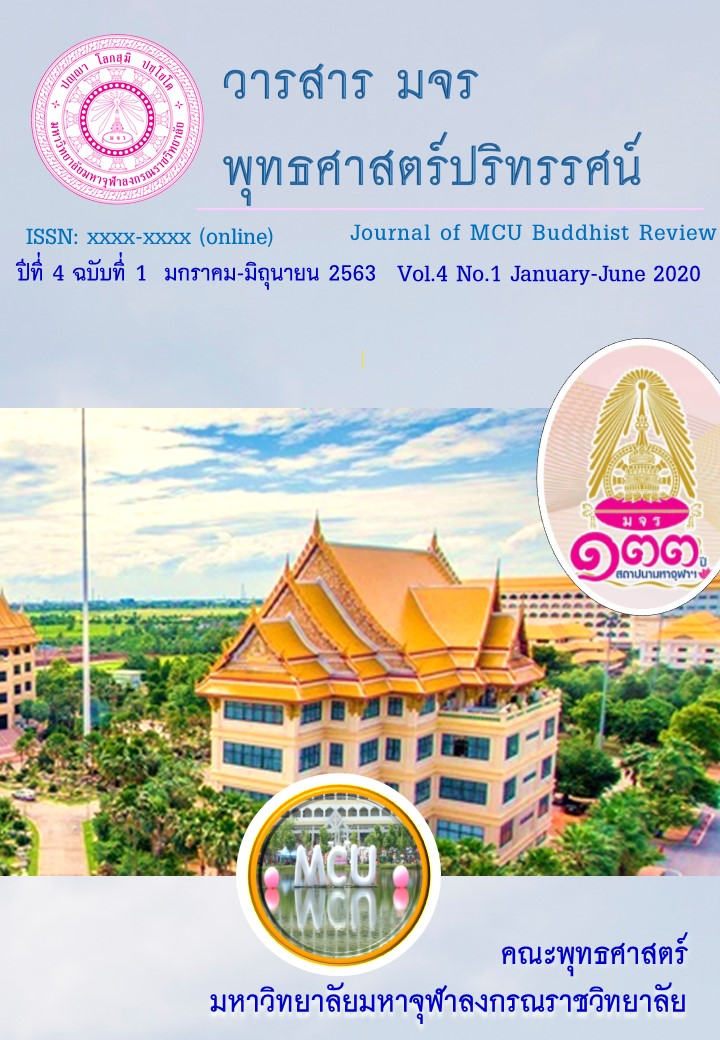ปรัชญาชีวิตกับการปฏิบัติธรรม
Main Article Content
บทคัดย่อ
บทความวิชาการเรื่อง “ปรัชญาชีวิตกับการปฏิบัติธรรม” ลักษณะเด่นอย่างหนึ่งของพุทธศาสนาคืน เป็นทั้งศาสนาและปรัชญา เพราะพระพุทธเจ้าทรงเป็นนักคิดและนักปฏิบัติ ในฐานะเป็นนักคิด พระองค์ทรงสร้าง “ปรัชญาแห่งทางสายกลาง” ในการแสวงหาความรู้และในการพ้นทุกข์ และ “ปรัชญาแห่งเสรีภาพ” เพื่อปลดปล่อยมนุษย์ให้พ้นจากอำนาจต่างๆ ทั้งภายในตัวและนอกตัวมนุษย์จะได้มีเสรีภาพสมบูรณ์แบบ และความสุขสูงสุด ปรัชญาแห่งมนุษยนิยม ส่งเสริมมนุษย์ให้มั่นใจในศักยภาพของตนที่จะช่วยตัวเองให้พ้นทุกข์และ มีความสุขที่แท้จริงได้ด้วยการกระทำของตัวเองโดยไม่ต้องอาศัยอำนาจนอกตัว “ปรัชญาแห่ง สันติสุข” เพื่อให้มนุษย์มีจิตใจเปิดกว้างในเรื่องศาสนาและความจริง ไม่ยึดติดกับความคิดเห็นและความเชื่อของคนเป็นสำคัญพร้อมทั้งมีความรักความเอื้ออาทรต่อกัน นอกจากนั้นยังทรงเน้นให้ ชาวพุทธให้เหตุผลและประสบการณ์ทดสอบพระธรรมด้วยตัวเองให้เห็นความจริงก่อนที่จะยอมรับและปฏิบัติตาม พระพุทธองค์ไม่ทรงต้องการให้ผู้ใดนับถือศาสนาพุทธด้วย “ศรัทธา” เท่านั้น เพราะความเชื่อศาสนาที่มีแต่ศรัทธาอย่างเดียวย่อมนำอันตรายมาสู่ศาสนิกชนและสังคมได้ง่าย เนื่องจาก “ศรัทธา” และ “ความงมงาย” มักจะอยู่ด้วยกัน
ในฐานะที่เป็นผู้นำทางศาสนา พระพุทธเจ้าทรงสอนวิธีปฏิบัติต่างๆ ที่จะช่วยให้คนพ้นทุกข์ประเภทต่างๆ จนสามารถมีความสุขสูงสุดไม่มีความทุกข์เจือปนอยู่เลยได้ การปฏิบัติที่สำคัญที่สุดคือการปฏิบัติตามมรรค ๘ หรือที่เรียกสั้นๆ ว่า ศีล สมาธิ ปัญญา เพื่อให้หลุดพ้นจากการเวียนว่ายตายเกิดในสังสารวัฏ
Article Details
- บทความที่ได้รับการตีพิมพ์เป็นลิขสิทธิ์ของวารสาร มจร พุทธศาสตร์ปริทรรศน์
- ข้อความใดๆ ที่ปรากฎในบทความที่ได้รับการตีพิมพ์ในวารสาร ถือเป็นความรับผิดชอบของผู้เขียนบทความ และข้อคิดเห็นนั้นไม่ถือว่าเป็นทัศนะและความรับผิดชอบของกองบรรณาธิการวารสาร มจร พุทธศาสตร์ปริทรรศน์
เอกสารอ้างอิง
พระพรหมคุณาภรณ์ (ป.อ. ปยุตโต). (2551). พจนานุกรมพุทธศาสน์ ฉบับประมวลศัพท์. พิมพ์ครั้งที่ 12. กรุงเทพมหานคร: บริษัท เอส. อาร์. พริ้นติ้ง แมส โปรดักส์ จำกัด.
มหาจุฬาลงกรณราชวิทยาลัย. (2539). พระไตรปิฎกภาษาไทย ฉบับมหาจุฬาลงกรณราชวิทยาลัย, กรุงเทพมหานคร: โรงพิมพ์มหาจุฬาลงกรณราชวิทยาลัย.
วิทย์ วิศทเวทย์. (2549). “ชีวิตที่ดี”. วารสารสมาคมปรัชญาและศาสนาแห่งประเทศไทย ปีที่ 1 ฉบับที่ 2 (2549): 15.


